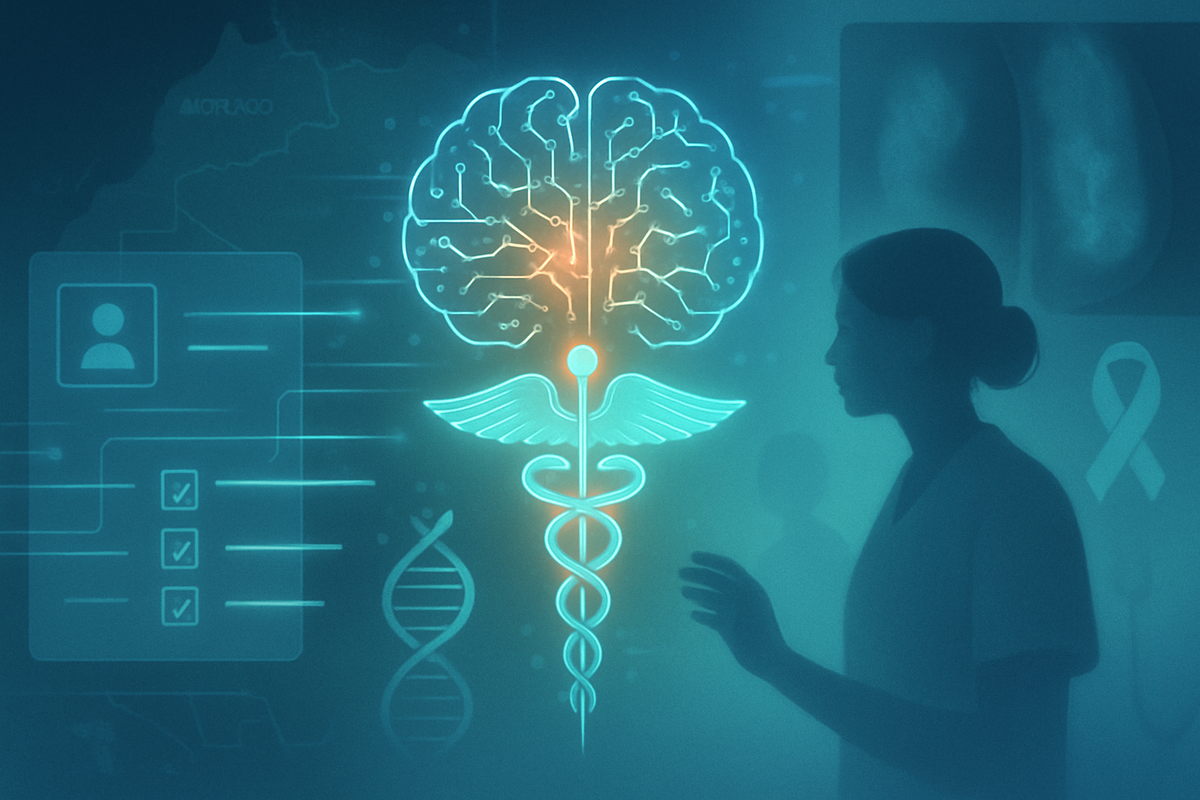
The healthcare sector stands on the precipice of a monumental transformation, driven by the relentless advance of Artificial Intelligence (AI). From streamlining administrative tasks to enhancing diagnostic accuracy, AI promises a future of more efficient, accessible, and personalized care. However, this technological revolution is not without its complexities, sparking debates over patient safety, job security, and ethical compliance, creating a volatile landscape for public companies and investors alike.
As of September 24, 2025, the integration of AI into healthcare is a multifaceted phenomenon. Medicare's planned adoption of AI for prior authorizations signals a nationwide shift towards automated efficiency, while at the same time, nurses at Kaiser Permanente are voicing staunch protests against AI's deployment, fearing its impact on patient care and staffing. Concurrently, the industry grapples with the evolving intricacies of HIPAA compliance in an AI-driven world, celebrates groundbreaking successes in AI-powered breast cancer screening, and observes the burgeoning AI healthcare ecosystem in Morocco. This intricate web of progress and protest defines the current financial narrative of AI in healthcare, offering both unprecedented opportunities and significant risks.
The Unfolding Narrative: Medicare's AI Leap, Kaiser's Backlash, and Global Adoption
The Centers for Medicare & Medicaid Services (CMS) began rolling out AI tools for prior authorizations in Traditional Medicare in 2024, specifically targeting high-cost outpatient services under its "Wasteful and Inappropriate Service Reduction (WISeR)" model. This initiative, reinforced by the January 2024 CMS Interoperability and Prior Authorization Final Rule, aims to dramatically cut administrative burdens and processing times—potentially by up to 70% for straightforward cases. While promising efficiency, this move has ignited significant concern among providers. A March 2025 survey by the American Medical Association (AMA) revealed that 61% of physicians fear unregulated AI in prior authorizations is leading to increased denials, overriding medical judgment, and potentially harming patients. The AMA is actively lobbying for stronger oversight and transparency.
Parallel to Medicare's embrace, a strong counter-narrative is emerging from the front lines of healthcare. Nurses at Kaiser Permanente, represented by the California Nurses Association (CNA), have staged multiple protests, including hundreds demonstrating in April 2024 outside Kaiser Permanente's San Francisco Medical Center. Their signs, such as "Trust Nurses, Not AI" and "Patients are NOT Algorithms," underscore deep anxieties about "untested and unregulated AI" compromising patient safety and staffing levels. Further protests in August 2025 at Kaiser Permanente San Rafael linked proposed layoffs to the hospital's increasing reliance on AI, raising fears of medication errors and delayed patient care. Kaiser Permanente, a prominent integrated managed care consortium, maintains that AI tools are designed to empower nurses and improve outcomes, not replace human decision-making.
Navigating this rapidly evolving landscape, HIPAA compliance remains a paramount concern. By 2025, an estimated 90% of healthcare organizations are expected to use some form of AI. The HIPAA Security Rule mandates strict adherence for AI systems processing protected health information (PHI), requiring robust data anonymization, de-identification, encryption, and access controls. The Office for Civil Rights (OCR) has increased penalties for violations, and a proposed 2025 Department of Health and Human Services (HHS) regulation will require AI tools to be included in risk analysis and management. This necessitates thorough vendor oversight and transparent AI algorithms, presenting both challenges and opportunities for specialized compliance solutions.
Beyond administrative and ethical debates, AI is delivering tangible clinical advancements. In breast cancer screening, AI algorithms are proving instrumental in analyzing mammograms and other imaging techniques, often matching or exceeding human accuracy. The global AI in breast imaging market is projected to grow from $538.39 million in 2025 to $844.52 million by 2034, driven by the critical need for early detection. Studies like the real-world PRAIM trial have shown AI-supported mammography can increase detection rates by up to 17.6%, identifying one additional cancer case per 1,000 women screened without increasing recall rates. Companies like Google Health (NASDAQ: GOOGL), iCAD (NASDAQ: ICAD), Hologic (NASDAQ: HOLX), and GE Healthcare (NASDAQ: GEHC) are leading these innovations, though clinical adoption, despite over 20 FDA-approved applications, remains variable.
On the international stage, Morocco is emerging as a leader in AI healthcare adoption within North Africa, propelled by its "Digital Morocco 2030" strategy. Reports indicate nearly half of Moroccan hospitals use AI for scheduling, and 30% for diagnostic support, with robotic surgeries increasing by 30% between 2020 and 2024. A 2023 study at Casablanca's University Hospital found 48% of doctors using AI daily for diagnostics. Initiatives like the Moroccan Ministry of Health's partnership with IBM (NYSE: IBM) for remote breast cancer detection, alongside local startups like DeepEcho and DataPathology, showcase AI's potential to address healthcare disparities and improve accessibility in developing regions.
Market Movers: Winners and Losers in the AI Healthcare Arena
The accelerating integration of AI into healthcare creates a clear dichotomy of potential winners and those facing significant challenges within the financial markets. On the winning side are companies specializing in AI-driven administrative solutions, particularly those addressing prior authorizations. Large health insurers and their tech subsidiaries, such as UnitedHealth Group (NYSE: UNH) with Optum and CVS Health (NYSE: CVS) with Aetna, are poised to benefit from Medicare's AI adoption, as their existing technological infrastructures can be leveraged to develop and deploy these solutions at scale. Smaller, agile AI health tech firms like Evolent Health (NYSE: EVH), which focus on value-based care and administrative efficiency, could also see increased demand for their specialized platforms.
Companies at the forefront of AI diagnostics and medical imaging are also set for substantial growth. Google Health (NASDAQ: GOOGL) continues to expand its AI capabilities in various medical fields, including breast cancer screening. Specialized firms like iCAD (NASDAQ: ICAD) and Hologic (NASDAQ: HOLX), which offer AI-powered mammography and imaging analysis, stand to gain as clinical adoption of these proven technologies increases. Similarly, GE Healthcare (NASDAQ: GEHC) with its extensive imaging portfolio and AI integration efforts is well-positioned. Furthermore, the stringent demands of HIPAA compliance for AI solutions will create a booming market for cybersecurity and data management firms. Cloud service providers like Microsoft (NASDAQ: MSFT) Azure and Amazon (NASDAQ: AMZN) Web Services (AWS), which offer HIPAA-compliant infrastructure and AI development tools, will be critical enablers for healthcare organizations.
Conversely, traditional healthcare providers, particularly smaller hospitals and clinics, may face significant headwinds. The initial investment required for AI integration, staff training, and adapting workflows can be substantial. Those that fail to adopt AI efficiently risk being left behind in terms of cost-effectiveness and patient outcomes. Companies that rely heavily on traditional, manual administrative processes could also see their business models disrupted as AI automates these tasks. Moreover, any public company perceived as prioritizing AI over human care, especially in light of protests like those at Kaiser Permanente, could face reputational damage, public backlash, and potential regulatory scrutiny, impacting investor confidence. Companies that fail to rigorously address ethical AI development and HIPAA compliance could also incur hefty fines and legal liabilities, turning potential gains into significant losses.
The Broader Significance: Reshaping Healthcare's Future
The current developments surrounding AI in healthcare are not isolated incidents but rather critical indicators of broader industry trends. This rapid integration aligns with the global shift towards value-based care, where outcomes and efficiency are prioritized over fee-for-service models. AI's ability to streamline administrative processes, reduce diagnostic errors, and enable personalized treatment plans is central to achieving these objectives. The push for AI in prior authorizations by CMS highlights a systemic effort to curb healthcare costs and reduce administrative waste, a long-standing challenge for the U.S. healthcare system.
The regulatory landscape is also undergoing a significant transformation. The AMA's call for greater oversight and transparency in AI-driven decisions, coupled with the proposed HHS regulations for AI risk analysis, signals an inevitable move towards more stringent governance. This will likely lead to the development of new federal and state policies specifically tailored to AI in healthcare, focusing on algorithmic bias, data privacy, accountability, and ethical deployment. Companies that proactively engage in ethical AI development and demonstrate robust compliance frameworks will gain a competitive advantage.
The workforce implications are profound. While AI promises to automate mundane tasks, freeing up healthcare professionals for more complex patient interactions, it also sparks fears of job displacement, as evidenced by the Kaiser Permanente nurses' protests. This tension will necessitate significant investment in upskilling and reskilling the healthcare workforce to adapt to AI-augmented roles. Historically, technological disruptions in healthcare, such as the widespread adoption of Electronic Medical Records (EMRs), initially faced resistance and implementation challenges but ultimately reshaped workflows and improved data management. AI's impact is expected to be even more transformative, requiring a delicate balance between technological advancement and human-centric care. The ethical considerations of AI—including algorithmic bias in diagnostics, data security, and the transparency of decision-making processes—will continue to be central to public discourse and regulatory efforts, shaping public trust and adoption rates.
What Comes Next: A Glimpse into the Future
In the short term, the healthcare industry can expect intensified debate and legislative efforts around AI regulation, particularly concerning patient safety and accountability. Medicare's AI initiatives will likely expand, pushing more providers and payers to adopt similar technologies, leading to increased demand for specialized AI solutions. This will spur further investment in AI startups focused on administrative automation and diagnostic support. Concurrently, public and professional resistance, as seen with the Kaiser nurses, will continue to shape the narrative, potentially leading to more collaborative approaches to AI implementation that prioritize clinician input and ethical guidelines.
Looking further ahead, the long-term impact of AI on healthcare is poised to be truly transformative. We can anticipate significant advancements in areas like AI-driven drug discovery, personalized medicine tailored to individual genetic profiles, and sophisticated predictive analytics for disease outbreaks and patient deterioration. This will lead to improved patient outcomes, potentially lower healthcare costs (despite initial investment), and a more proactive, preventative approach to health. However, this future also presents challenges: the potential for widening health disparities if AI access is not equitable, and the continuous need to guard against algorithmic bias that could disproportionately affect certain populations.
Strategic pivots will be essential for all stakeholders. Healthcare organizations must invest heavily in robust IT infrastructure, cybersecurity, and comprehensive training programs to prepare their workforce for an AI-augmented environment. Technology companies will need to focus on developing transparent, auditable, and ethically sound AI solutions, collaborating closely with clinicians and patient advocacy groups. Market opportunities will emerge in niche AI applications, such as remote patient monitoring, mental health support, and specialized diagnostic tools for rare diseases. Investors should closely monitor regulatory developments, public sentiment shifts, evidence of tangible ROI from AI implementations, and the competitive landscape of AI solution providers. The coming months will be crucial in determining the trajectory of this powerful technology and its lasting impact on global health and financial markets.
Wrap-Up: Navigating the AI Frontier
The integration of AI into healthcare represents a pivotal moment, offering a compelling blend of unprecedented innovation and significant operational and ethical challenges. From Medicare's strategic move to automate prior authorizations to the vocal protests of Kaiser Permanente nurses, the narrative is one of rapid technological advancement meeting the deeply human concerns of care quality and workforce impact. While AI promises to revolutionize diagnostics, streamline administration, and enhance patient outcomes, the industry must rigorously address issues of HIPAA compliance, algorithmic bias, and the imperative to maintain a human-centric approach to healthcare.
Moving forward, the financial markets will closely watch how healthcare providers, payers, and technology companies navigate this complex terrain. Success will hinge on a delicate balance: embracing AI's efficiency gains while ensuring patient safety, fostering ethical development, and addressing the legitimate concerns of the healthcare workforce. Investors should focus on companies demonstrating strong governance in AI development, robust cybersecurity measures, clear ROI from their AI solutions, and a commitment to transparent and ethical deployment. The next few years will define not only the future of healthcare delivery but also the fortunes of those public companies that can skillfully wield AI's double-edged scalpel to cut through inefficiencies without severing the vital human connection at the heart of care.
This content is intended for informational purposes only and is not financial advice





